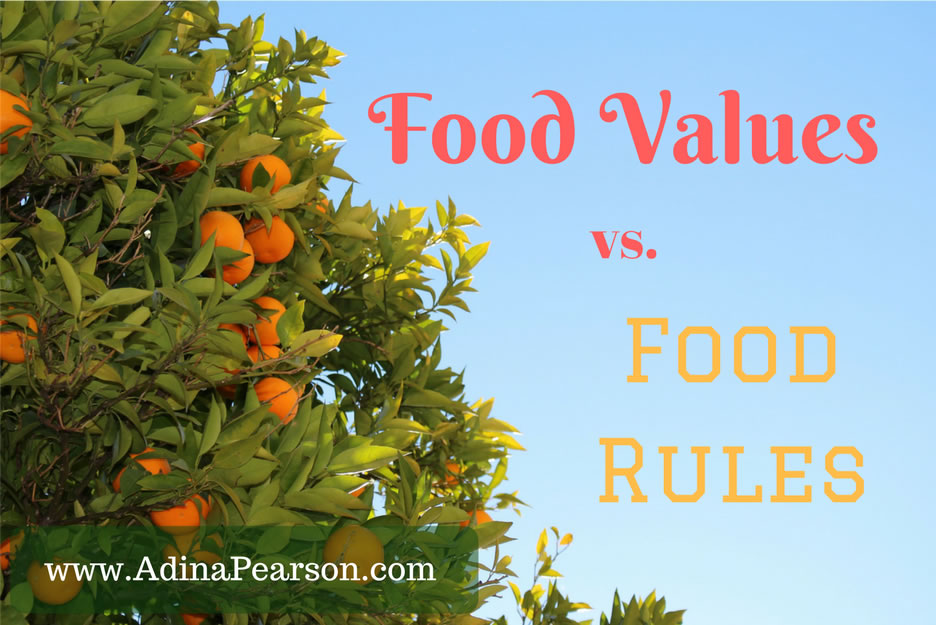Food Values vs. Food Rules
This was originally published on my child feeding blog, HealthyLittleEaters. I’m reposting it here because it pertains to feeding yourself.
DONUTS
Yesterday I took the kids to the store for donuts after school. It was the first day of National Nutrition Month, after all. Okay, fine the two events were purely coincidental.
There was another man there waiting to pick his donuts. He thought it was “cool” that I was letting each kid choose their pastry and then quipped that I was probably “not their mom.” I happily shared that I was not only their mom, but… a … DIETITIAN.

His eyes grew wide and then decided that what I’d told him was confessional: “Oh, you’re breaking the rules!”
Shrugging, I responded “I don’t really follow rules.” I then added something brief about pleasure, balance, moderation, but I lost him.
I’m not kidding, though, about not following rules. And I didn’t say it merely to sound rebellious. The truth is food rules are generally not helpful.
FOOD VALUES vs. FOOD RULES

Over the last couple months I was searching for a way to discuss health with clients who seemed to hold to a very rigid and stress-inducing definition. I asked fellow RDs, and the brilliant Emily Fonnesbeck suggested exploring Food Rules vs. Food Values. It’s been an eye-opening topic for clients every time I’ve used it.
If food has been a struggle for you, if you’ve lost trust in your ability to eat well, food rules can make you feel safe. Temporarily. Just like diets, though, soon they become burdensome and difficult to manage. They also prevent you from restoring the very trust you need to be free from food worries.
Food rules reflect rigidity and they are hard to live with. One example of a food rule is “never eat past 7pm.” It doesn’t allow for long summer days, a busy day that pushed dinner late, genuine hunger after dinner on a night you stay up late, or a normal desire to satisfy the occasional craving. A rule makes real life difficult and food into a fight. The black/white nature of food rules leads to anxiety and fear if you break them–or even toward the potential to break them. It also makes most of us humans feel rebellious because most food rules are rather arbitrary.
On the bright side Food Values reflect your core values, how you want to live, how you want to feel. Living according to our values feels empowering rather than restricting.
In contrast to a rule about never eating past a certain time. A food value might be “I like going to bed feeling comfortable.” Some nights having a bedtime snack would mean living out your value because you were hungry and didn’t want to go to bed with a growly stomach. Other nights skipping a bedtime snack when you are quite full from dinner might mean avoiding discomfort, or even reflux, from an overly full stomach.” Do you see how the value allows choices to fit the varying situations you are in?
I’m willing to bet that someone like Janet Nezon, of Rainbow Plate, values vibrantly colorful meals! But I’m also fairly certain that not all meals she eats have to be Red-Orange-Yellow-Green-Blue-Purple. And she doesn’t feel guilt or shame over a more monotone meal.
Food Values have to do with keeping your eyes on the big picture of health. And that big picture involves more than just individual nutrients. It includes pleasure, enjoyment, satisfaction, relationships, sanity, and listening to your body rather than trying to follow someone else’s blueprint. When you choose food and eat in accordance with your values and big picture health, it feels good and you want to do it again.
And then, yes, even donuts can fit. No rule breaking, no guilt.
Think about where you might be creating food rules for yourself and how you can replace them with food values.
If you’re ready to get off the diet roller coaster with all its rules and restrictions and trade all that in for a joyful and realistic ways to take care of yourself with food, schedule a 15 minute FREE discovery call with me: Click here